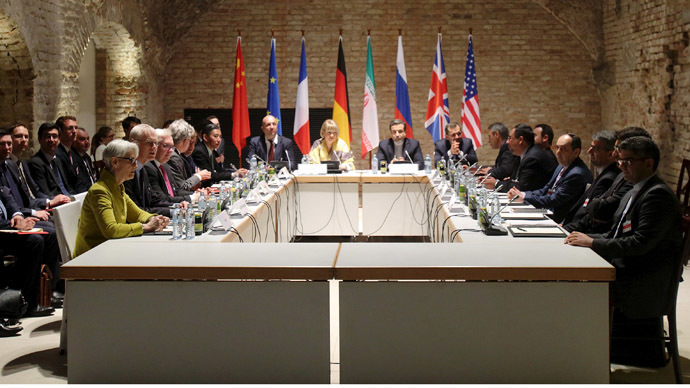Secret doc: US to give Tehran nuclear technology, refurbish reactor under deal

As negotiators are about to gather in Vienna for the final round of talks on Iran’s controversial nuclear program, the US is offering concessions to Tehran to sweeten the deal, a draft document detailing would-be deal’s term shows.
The negotiations between Iran and six leading world powers are to kick off in the Austrian capital, Vienna, on Friday, with deadline set for June 30. Diplomats however indicated that the talks may drag past the date, as was the case with the previous round that produced a preliminary agreement, which seeks to scale down the program in exchange for lifting of international sanctions.
READ MORE: Israel suspends defense aid talks with US, awaits outcome of Iran nuclear deal
As the hard talks are set to start, the US is willing to offer concessions to Tehran that would boost its civilian nuclear industry, AP reported citing a confidential document perpetrating to the deal. The draft is one of several technical appendices meant to detail the terms, and it has dozens of text marked by brackets that indicate wordings over which the parties do not agree.
Titled ‘Civil Nuclear Cooperation’, the eight-page document details the practical steps that the US, the UK, France, Germany, China and Russia are willing to offer to compensate Iran the closure of parts of its nuclear program through cooperation.
One of the stumbling blocks is the fate of Arak heavy water reactor that Iran is in the final stages of constructing. The reactor would be capable to produce plutonium, a fissile material that can be used to make a nuclear weapon. The draft document offers rebuilding the facility to a more proliferation-friendly light water reactor, with sensitive technology and know-how transferred to Iran. Tehran would retain “the leadership role as the project owner and manager,” the draft said.
The document also offers arrangements for the underground uranium enrichment facility in Frodo, which would be converted with international help to produce radioactive isotopes for medical and scientific purposes. The facility is believed to be highly resistant to potential airstrikes and the US has been insisting on its conversion.
READ MORE: Oil firms Shell, Eni visit Iran as nuclear deal nears
The concessions offered however may give ammunition to critics of the would-be deal both in US and internationally, who believe that it would give too much ground to Iran and puts too little restrictions on its nuclear program. On Wednesday several former US officials, including President Barack Obama’s former Iran advisor Dennis Ross published an open letter calling on Washington to seek a stronger deal.
“We know much about the emerging agreement. Most of us would have preferred a stronger agreement,” the group, which also includes former CIA head David Petraeus, Stephen Hadley, former national security adviser to President George W Bush, and General James Cartwright, former vice-chairman of the Joint Chiefs of Staff.
“We fear that the current negotiations, unless concluded along the lines outlined in this paper and buttressed by a resolute regional strategy, may fall short of meeting the administration’s own standard of a ‘good’ agreement,” they said.
The White House deflects criticisms that the potential deal would be ‘bad’ voiced by Israeli PM Benjamin Netanyahu and other officials and experts, saying that it would be as good as it can be realistically expected and that it would significantly reduce the risk of Tehran rushing to obtain nuclear capability.
Iran denies any intention to build a nuclear weapon and says it needs a nuclear industry for civilian purposes only. Opposition to the upcoming deal remains strong inside the Islamic Republic as well, as fears linger that the negotiators would concede too much of Iran’s treasured nuclear advances.
#Iran's Major Red Lines in Nuclear Negotiations. #IranTalkspic.twitter.com/RlHL9BXklm
— Khamenei.ir (@khamenei_ir) June 24, 2015
On Tuesday Iran’s supreme leader Ayatollah Ali Khamenei reiterated his position, saying that no deal would be made that would allow international inspectors to visit military facilities. Tehran is concerned that such inspectors would double as spies for the US and its allies. Washington says it wants such inspections to maintain a robust verification regime to ensure that Iran is sticking to its part of the bargain.












